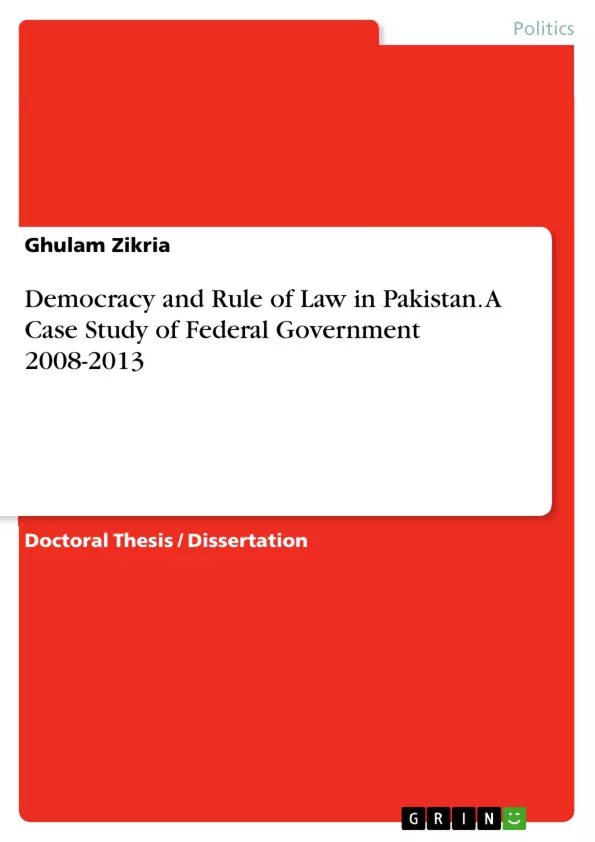The root meaning of democracy is the “power of the people” to govern the state directly or through their representatives, chosen via free and fair elections. These representatives reflect the will of the majority, but democracy also ensures the fundamental rights of minority groups. As the most popular system of government globally, democracy allows people to make decisions for themselves and the public good. Adherents of democracy and the rule of law argue that government must operate on predictable, general, and applicable rules established in advance to ensure equality, uphold laws and human rights, and deliver prompt justice. Thus, democracy and the rule of law are seen as inseparable and interdependent by political scholars, analysts, and politicians.
Since its founding in 1947, Pakistan’s political history has been marked by challenges with democracy and the rule of law. Military coups, authoritarian rule, bureaucratic interference, and political intolerance have prevented the establishment of stable political institutions. Civil and military dictators have curtailed freedoms by imposing military rule and excessive Presidential Ordinances, undermining the legislature. Judicial independence has often been compromised, with the judiciary used to extend dictatorial rule and legitimize arbitrary decisions under the pretext of “state necessity.” However, from 2008 to 2013, Pakistan saw a shift towards democratic principles. National integrity was strengthened through coalition-based government, and political tolerance was promoted by both the ruling party and the opposition. The parliament passed several laws, addressing issues such as abolishing the concurrent list and revising the resource allocation formula, which improved the rule of law. The military did not directly interfere, allowing the parliament to complete its term.
This shift in democracy and rule of law is analyzed using a qualitative approach, drawing on both primary and secondary sources. Primary sources include official reports, judicial verdicts, semi-structured interviews with prominent figures, parliamentary debates, and legal and historical documents. Secondary sources comprise newspaper articles, research journals, magazines, and various books. This study aims to provide a comprehensive understanding of the interplay between democracy and the rule of law in Pakistan, highlighting key challenges and developments.
Inhaltsverzeichnis (Table of Contents)
- Abstract
- Chapter 1: Introduction
- 1.1: Conceptual Framework
- 1.2: Historical Overview of Democracy and Rule of Law in Pakistan
- 1.3: Research Objectives and Questions
- 1.4: Research Methodology
- Chapter 2: Democratic Transition in Pakistan
- 2.1: The 2008 General Elections
- 2.2: The Role of Political Parties in the Transition
- 2.3: The Formation of a Coalition Government
- Chapter 3: The Role of Parliament in Strengthening Democracy
- 3.1: Parliamentary Performance and Lawmaking
- 3.2: The 18th Amendment and its Impact on Federalism
- 3.3: The Role of Opposition in Parliamentary Democracy
- Chapter 4: The Judiciary and the Rule of Law
- 4.1: Judicial Independence and the Protection of Fundamental Rights
- 4.2: The Judiciary's Role in Ensuring Good Governance
- 4.3: The Impact of Judicial Activism on Democracy
- Chapter 5: The Military and its Influence on Democracy
- 5.1: The Military's Role in Pakistani Politics
- 5.2: The Military's Relationship with the Civilian Government
- 5.3: The Military's Influence on the Judiciary
- Chapter 6: Challenges to Democracy and the Rule of Law in Pakistan
- 6.1: Corruption and Accountability
- 6.2: Terrorism and Extremism
- 6.3: Economic Challenges and Social Inequality
- Chapter 7: Conclusion
Zielsetzung und Themenschwerpunkte (Objectives and Key Themes)
This study aims to analyze the dynamics of democracy and rule of law in Pakistan during the period of 2008-2013. It investigates the progress made in strengthening democratic institutions, the role of the judiciary in upholding the rule of law, and the challenges faced in consolidating democratic governance. The study also examines the influence of the military on the political system and its impact on democratic processes.
- The transition towards democratic governance in Pakistan.
- The role of parliament in strengthening democracy and promoting political tolerance.
- The judiciary's contribution to safeguarding the rule of law and protecting fundamental rights.
- The influence of the military on political processes and its impact on democracy.
- The challenges to democracy and rule of law, including corruption, terrorism, and economic inequality.
Zusammenfassung der Kapitel (Chapter Summaries)
The study begins by examining the conceptual framework of democracy and rule of law, followed by an historical overview of the evolution of these concepts in Pakistan. Chapter 2 delves into the democratic transition of 2008, highlighting the role of political parties and the formation of a coalition government. Chapter 3 analyzes the parliament's performance, its role in lawmaking, and the impact of the 18th Amendment on federalism. Chapter 4 explores the judiciary's independence, its role in ensuring good governance, and the impact of judicial activism on democracy.
Chapter 5 examines the military's influence on political processes, its relationship with the civilian government, and its impact on the judiciary. Finally, Chapter 6 discusses the challenges faced by democracy and the rule of law in Pakistan, including corruption, terrorism, and economic inequality.
Schlüsselwörter (Keywords)
The key focus areas of this research include democracy, rule of law, Pakistan, political transition, parliament, judiciary, military, corruption, terrorism, and economic inequality. This study utilizes a qualitative approach, analyzing primary sources such as official reports, judicial verdicts, interviews, and parliamentary debates, as well as secondary sources like newspaper articles and academic publications.
- Quote paper
- Ghulam Zikria (Author), 2019, Democracy and Rule of Law in Pakistan. A Case Study of Federal Government 2008-2013, Munich, GRIN Verlag, https://www.grin.com/document/1502593



